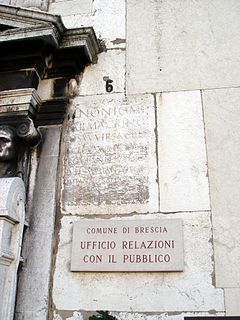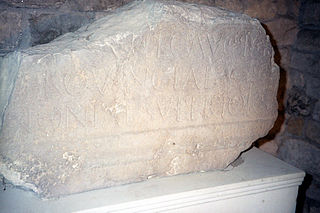Related Research Articles

Pannonia Inferior, lit. Lower Pannonia, was a province of the Roman Empire. Its capital was Sirmium. It was one of the border provinces on the Danube. It was formed in the year 103 AD by Emperor Trajan who divided the former province of Pannonia into two parts: Pannonia Superior and Pannonia Inferior. The province included parts of present-day states of Hungary, Serbia, Croatia, and Bosnia and Herzegovina. The province was bordered to the east by a Sarmatian tribe—the Iazyges. Later, the Vandals appeared to the north-east.

Marcus Nonius Macrinus was a Roman senator and general during the reigns of the Emperors Antoninus Pius, Lucius Verus, and Marcus Aurelius. Macrinus was suffect consul in the nundinium of April-June 154 as the colleague of [Prifernius ?] Paetus.
Publius Martius Verus was a Roman senator and general. He was twice consul. Verus played a major role in the suppression of the revolt of Avidius Cassius by remaining loyal to the emperor Marcus Aurelius.
Marcus Metilius Aquillius Regulus was a Roman senator of the second century. A member of the patrician order, he held the office of consul ordinarius in 157 with another patrician, Marcus Vettulenus Civica Barbarus, as his colleague.
Gnaeus Arrius Cornelius Proculus was a Roman senator who held at least one appointment in the emperor's service. His career is primarily known through inscriptions.
Lucius Dasumius Tullius Tuscus was a Roman senator who was an amici or trusted advisor of the emperors Antoninus Pius and Marcus Aurelius. He was suffect consul in the nundinium of April to June 152 as the colleague of Publius Sufenas.
Titus Prifernius Paetus Rosianus Geminus was a Roman senator of the second century who held a series of posts in the emperor's service. He was suffect consul for the nundinium of May-June AD 146 as the colleague of Publius Mummius Sisenna Rutilianus.
Publius Julius Geminius Marcianus was a Roman senator and general. He participated in the Roman–Parthian War of 161–166. Marcianus was appointed suffect consul in either 165 or 166.
Lucius Annius Fabianus was a Roman senator and general. He was suffect consul for the nundinium of November–December AD 141; his colleague is not known.
Publius Cornelius Dexter was a Roman senator and general active during the middle of the second century AD. He was suffect consul for the nundinium July-September 159; the name of his colleague is not known. Dexter is known only from non-literary sources.
Marcus Pontius Laelianus Larcius Sabinus was a Roman senator and general who held a series of offices in the emperor's service. He was suffect consul for the nundinium of July-August 145 as the colleague of Quintus Mustius Priscus. Laelianus is primarily known through inscriptions.
Publius Pactumeius Clemens was a Roman senator and jurisconsult active during the first century AD. He was suffect consul for the nundinium April-June 138 as the colleague of Marcus Vindius Verus; according to Ronald Syme, Clemens is the earliest known consul to hold the fasces in absentia. Although he is known solely through inscriptions, his life provides examples of how patronage operated during contemporary Rome.
Titus Flavius Longinus Quintus Marcius Turbo was a Roman senator who held a series of offices in the emperor's service. He was suffect consul for one of the nundinia in the years 149 through 151. Longinus is known primarily from inscriptions.
Quintus Camurius Numisius Junior was a Roman senator active during the later second century AD. He was suffect consul for a nundinium in the first half of the year 161 as the colleague of Marcus Annius Libo.

Marcus Iallius or Jallius Bassus was a Roman senator, general, and literary figure who held several offices in the imperial service during the mid-second century AD. He was suffect consul around the year 159. Bassus is known primarily from inscriptions. His full name was Marcus Iallius Bassus Fabius Valerianus.
Marcus Gavius Squilla Gallicanus was a Roman senator, who was active during the reigns of Antoninus Pius and Marcus Aurelius. He was suffect consul in 150 with Sextus Carminius Vetus as his colleague. He was also proconsular governor of Asia in 164/165.
Quintus Cornelius Proculus was a Roman senator, who was active during the middle of the second century AD. He was suffect consul in the nundinium of November–December 146 as the colleague of Lucius Aemilius Longus. Proculus is known entirely from inscriptions.
Marcus Servilius Fabianus Maximus was a Roman senator, who was active during the reigns of Antoninus Pius and Marcus Aurelius. He was suffect consul in a nundinium in mid-158 with Quintus Jallius Bassus as his colleague.
Marcus Cominius Secundus was a Roman senator, who was active during the reign of Marcus Aurelius. He was suffect consul in one of the later nundinia of 151 with Lucius Attidius Cornelianus as his colleague. He is known from inscriptions and military diplomas issued during his time.
Lucius Calventius Sextus Carminius Vetus was a Roman senator, who was active during the reign of Trajan. He was suffect consul in the nundinium of September to October AD 83 as the colleague of Marcus Cornelius Nigrinus Curiatius Maternus. He is known entirely from inscriptions.
References
- ↑ Géza Alföldy, Konsulat und Senatorenstand unter den Antoninen (Bonn: Habelt Verlag, 1977), p. 137
- ↑ CIL V, 3343
- ↑ CIL VIII, 23246
- 1 2 Salomies, Adoptive and polyonymous nomenclature in the Roman Empire, (Helsinski: Societas Scientiarum Fenica, 1992), p. 129
- ↑ Alföldy, Konsulat und Senatorenstand, p. 303
- ↑ Salomies, Adoptive and polyonymous nomenclature, p. 128
- ↑ Dabrowa, Legio X Fretensis: A Prosopographical Study of its Officers (I-III c. A.D.) (Stuttgart: Franz Steiner, 1993), p. 55
- ↑ Margaret M. Roxan, "Two Complete Diplomas of Pannonia inferior: 19 May 135 and 7 Aug. 143", Zeitschrift für Papyrologie und Epigraphik , 127 (1999) p. 253
| Political offices | ||
|---|---|---|
| Preceded by M. Vindius Verus P. Pactumeius Clemens as suffecti | Suffect consul of the Roman Empire October–December 138 with Publius Cassius Secundus | Succeeded by Antonius Pius II G. Bruttius Praesens L. Fulvius Rusticus II |